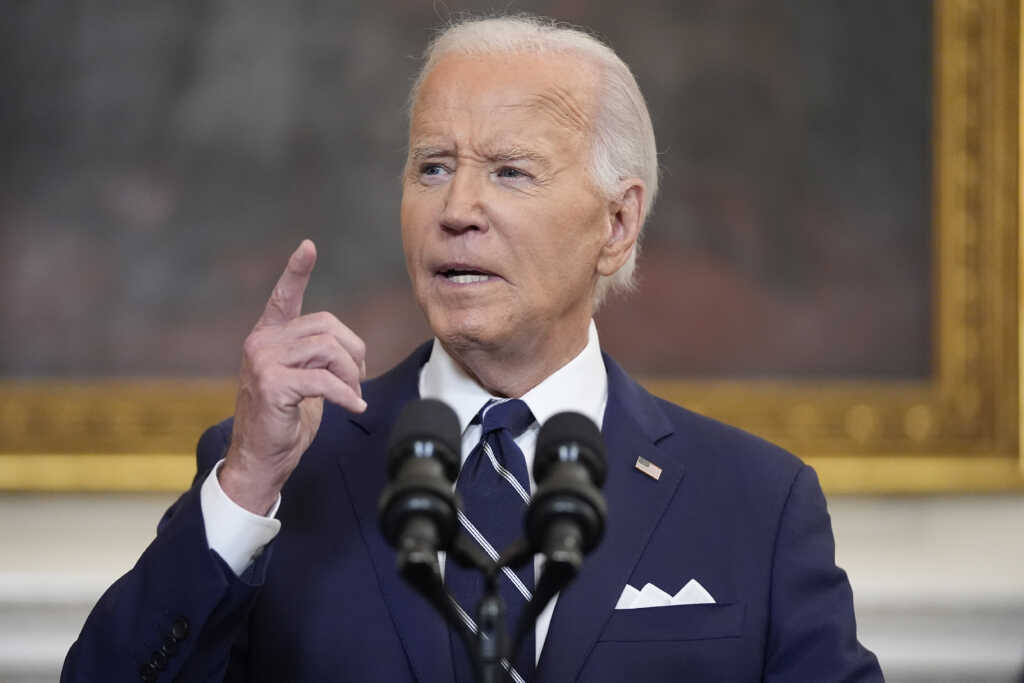With the 2024 election cycle continuing to take many twists and turns, President Joe Biden’s sweeping proposals to alter the U.S. Supreme Court are certain to reignite headlines as the campaign intensifies.
Jeremy Dys, senior counsel for First Liberty, a conservative legal firm, opposes Biden’s recommendations and said he believes the Supreme Court has long been used to drive a wedge between voters.
Listen to them on the latest episode of “Quick Start” 👇
“That the Supreme Court would be used by the left as a political tool or a political weapon, I think is just simply shameful,” he said. “Our republican-democracy here requires judicial independence.”
And Dys wasn’t done there. He also lamented the Biden administration’s improper use of court-packing threats and other related tactics “to try to get their way.”
The attorney said the proposal for term limits would immediately impact Justices Clarence Thomas and Samuel Alito, who are largely seen as more conservative justices. Terms would be limited to 18 years, and presidents would nominate judges to the court every two years.
“It all comes clear into view what the real target here is,” Dys said. “They can’t get their way at the Supreme Court, and, so, now, in their view, they have to punish.”
He continued, “I think it’s just simply shocking and should shock the conscience of every American. What this would do immediately would be to drive off the two conservatives on the bench that the left hates the most.”
Dys believes this is the “very point” of the effort and said this “type of political vindictiveness should never be rewarded.”
Looking back at historical precedent, the attorney said he believes the lifetime appointments for judges were set in motion to provide the “maximum amount of judicial independence” and to insulate the justices as much as possible from the political pressures of the day.
Brad Jacob, a Regent University professor and legal expert, recently offered his own analysis of Biden’s plans and expressed a similar belief that Biden’s proposals are rooted in political “discontent.”
“The primary thing that’s going on here is discontent within the political left with recent decisions of the Supreme Court,” he told CBN News. “And that’s nothing new. I mean, throughout our nation’s history, if people believe the Supreme Court has messed something up, people try to figure out ways to deal with this.”
Jacob said the problem with trying to change the court’s structure is that the other side will simply try to do the same when given the opportunity.
“Our original Constitution had no term limits,” Jacob said. “Term limits for the president were added by amendment after [President] Franklin Roosevelt was elected for a fourth term. Up until then, every president had followed George Washington’s lead and stepped down after two.”
He continued, “We don’t have term limits for members of the House and the Senate, although that was a big part of the Newt Gingrich contract with America in 1994, when Republicans took control of Congress. They were going to do term limits, but they didn’t.”
Supreme Court justices have something called “life tenure,” which essentially means they’re on the court for life unless they resign, die, or are impeached and convicted; the latter has never unfolded, though Associate Justice Samuel Chase was impeached in 1804, but not removed from office.
“In reality, it’s very hard to remove a justice from the court,” Jacob said. “The idea of that was to let the judiciary be independent, to keep it free from partisan politics.” Read the rest of his arguments here.
Others like Michael Waldman, president and CEO of the Brennan Center for Justice at NYU School of Law, take a different view. In fact, Waldman said Biden’s Supreme Court reform efforts are “in many ways…conservative ideas.”
“Term limits rest on a foundational premise of accountability: nobody should hold too much public power for too long,” Waldman wrote. “George Washington taught us that when he stepped down after two terms.”
He also cited what he said is bipartisan support for term limits, noting past polling. Read more about his position here.
Others like Amanda Hollis-Brusky, a politics professor at Pomona College in Claremont, California, agree with Waldman and echo the idea that the term limit proposal has bipartisan appeal.
“As conservative scholar Steven Calabresi and his co-author wrote in 2006, moving to a system of 18-year terms ‘would restore the norms in this country that prevailed on the Court between 1789 and 1970, when vacancies occurred about once every two years, and Justices served an average of 14.9 years on the Court,'” Hollis-Brusky recently wrote.
She continued, “Supreme Court justices are serving longer and longer, but this is a relatively recent trend. Justices who have left the bench since 1990 served an average of 26.3 years, based on 2021 research, almost double what Calabresi reports from the first two centuries of Supreme Court practice.”
The justices themselves have been relatively quiet about the issue, though Justice Neil Gorsuch did warn Biden and others seeking to reform the court. He cited the need for an independent judiciary that protects people even when they’re not in line with “popular” opinion.
“There for the moments when, when the spotlight’s on you, when the government’s coming after you, and don’t you want a ferociously independent judge and a jury of your peers to make those decisions,” Gorsuch told Fox News’ Shannon Bream. “And so, I just say, be careful.”
***As the number of voices facing big-tech censorship continues to grow, please sign up for Faithwire’s daily newsletter and download the CBN News app, invented by our parent company, to stay up-to-date with the latest news from a distinctly Christian perspective.***



